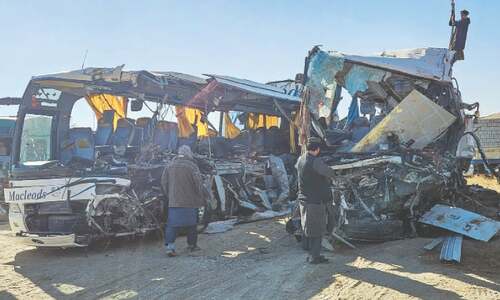PESHAWAR, Dec 26: Khyber Pakhtunkhwa will go back to the old local government system from January 1, 2013, according to an official handout issued here on Wednesday.
In this respect, the provincial government promulgated Khyber Pakhtunkhwa Local Government Act 2012 with effect from January 1, 2013.
Under the Act, district councils and municipal committees in all 25 districts of the province and municipal corporation in Peshawar would be established from the start of the new calendar year, said the notification.
The provincial assembly on May 8 this year passed the Khyber Pakhtunkhwa Local Government Act, 2012, paving the way for the revival of local bodies system in vogue in the country before the government of Gen (retired) Pervez Musharraf with minor changes.
President Asif Ali Zardari had already approved extension of the Act to Malakand division and Provincially Administered Tribal Areas (Pata), sources in local government and rural development department told Dawn on Wednesday.
Sub-clause (3) of clause 1 of the Act states: “It shall come into force on such date as government may, by notification appoint, and different dates may be appointed for different provisions of this Act.”
The provincial government had dissolved the elected councils on February 20, 2010, and replaced the elected nazims with administrators. Announcing the dissolution in a press conference at that time, the then senior minister Bashir Ahmed Bilour had claimed that the local bodies’ elections would be held within six months.
However, Mr Bilour one day before his assassination on December 21 told a press conference that general elections were round the corner so it was not possible to hold local bodies’ elections.
In the absence of the elected representatives, the government would post administrators as chief of the district councils, municipal committees and municipal corporation in Peshawar, sources said. The administrators have already been heading tehsil municipal administrations from about three years after abolishment of Local Government Ordinance 2001.
“Let first implement the law, the adjustment of employees was subsequent issue,” said officials when asked about the adjustment of the employees of the tehsil municipal authorities into district councils, municipal committees and municipal corporation.
The Act empowers the provincial government to appoint one or more magistrates, or authorise any officers to exercise the power of the magistrate for trial of offences provided in the schedule of this law.
The law provides that election of members of all union councils and municipal committees should be held on the basis of adult franchise and joint electorate through secret ballot.
The government has been empowered to divide a local area into such number of wards having a definite boundary as it may determine. A union shall be a multi-member ward for election of member of union council.
Under the Act, a union council shall consist of 11 members including seven Muslim general members, two women members, one member each for peasants and workers and minority communities.
The number of general members of a district council is equal to the total number of union councils in the district as chairman of each union council will be general member of the district council concerned. The new law provides that the chairman and vice chairman of the district council shall be elected by the members of the district council.
Similarly, the number of general members of municipal corporation is equal to the number of union councils falling in the limits of the corporation. The chairman of an urban union council in the limits of corporation will be a member of the corporation.
For the first time seats will be reserved for technocrats in the local councils. Under the Act, five per cent seats should be reserved for technocrats in the local councils except union councils. Apart from the seats reserved for technocrats, 10 per cent seats are reserved for women and five per cent each for peasants, workers and minorities in the local councils except union council.The law empowers the government to notify the number of members of a municipal committee. The member of the municipal committee will be elected through direct elections based on adult franchise and joint electorate.
Under the new law, a local council in its first meeting and to the exclusion of any other business will elect from its members a chairman, vice chairman, mayor and deputy mayor in the prescribed manner.
Every local council may establish and promote community based organisations, representing cross sections of society to facilitate public participation in the functions of local councils.
The term of office of a local council will be four years commencing on the date on which it holds its first meeting. On the expiry of the term of office of a local council, the government may appoint any person for the interim period to perform functions of the local council.











































Dear visitor, the comments section is undergoing an overhaul and will return soon.